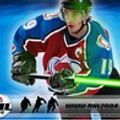Steve: Now, what advice would you give to young children, young boys or girls, now? I mean, girls' hockey has become more popular. I mean, you've obviously been able to have a very interesting and successful and varied career in hockey, going to many different countries with Team Canada, and then playing in these different countries. I'm sure it would be a dream for many boys and girls that are playing hockey today. Would you have any advice to them, in how they should approach hockey?
Mark: I think that today, probably no different than when I was growing up, kids, especially boys but girls now, obviously as well - there's no Girl's NHL, for example - for boys to dream about playing in the NHL, I think, is natural and quite common now. At the same time, I think that parents shouldn't focus on the NHL and put pressure on their kids in that direction. I think what's most important is that the kids enjoy playing the game just for playing it, and hopefully that will stay with them their whole lives. Because I've played hockey professionally for the last ten years, but I would say I still enjoy playing. If I didn't enjoy playing I wouldn't be playing any more. It does happen where kids are pressured from an early age, and they end up not enjoying it, and that's, I think, the worst thing that could happen. Any particular advice to smaller players? I mean you are somewhat small, and perhaps that's one reason why you never made it to the NHL. Paul Kariya, who's a good friend of yours, is a smaller player who's done very well. What should the smaller player try to do so that he or she can succeed in hockey?
Well I think, for the smaller player, it's important to focus on skill development. Having said that, it's important for the bigger player to focus on skill development as well. I mean, any edge you can gain on your competition that's going to make you better than your competition is going to help you. Now obviously, a bigger guy can get away with having poorer skills than a smaller guy, because a bigger guy is able to play a more physical game, which is also a part of hockey. A smaller guy - when you talk about moving on to higher levels, for example the NHL - they're not going to bring a smaller guy into to play physical hockey, for the most part. If they're going to bring a smaller guy in, he's got to be skilled, he's got to be able to create plays and score goals, that type of thing. So for a smaller guy: Work on your skills, work on your conditioning.
Any advice for parents?
I would say to parents: You know be supportive. Don't put pressure on your kid to make it to the NHL, but try and do things that point him in the right direction as far as how he can improve his game. Whether it's sending him to hockey school, or setting him up with the right advice on how to train to be in better shape to play. Anything that'll help him get better without sort of having the NHL as a goal, more so keeping in mind that he should be focused on having fun when he plays. Um-hmm. I think that's a good place to end our conversation. Hockey is a game. Games should be fun, and it's been fun talking to you. Thank you very much.

